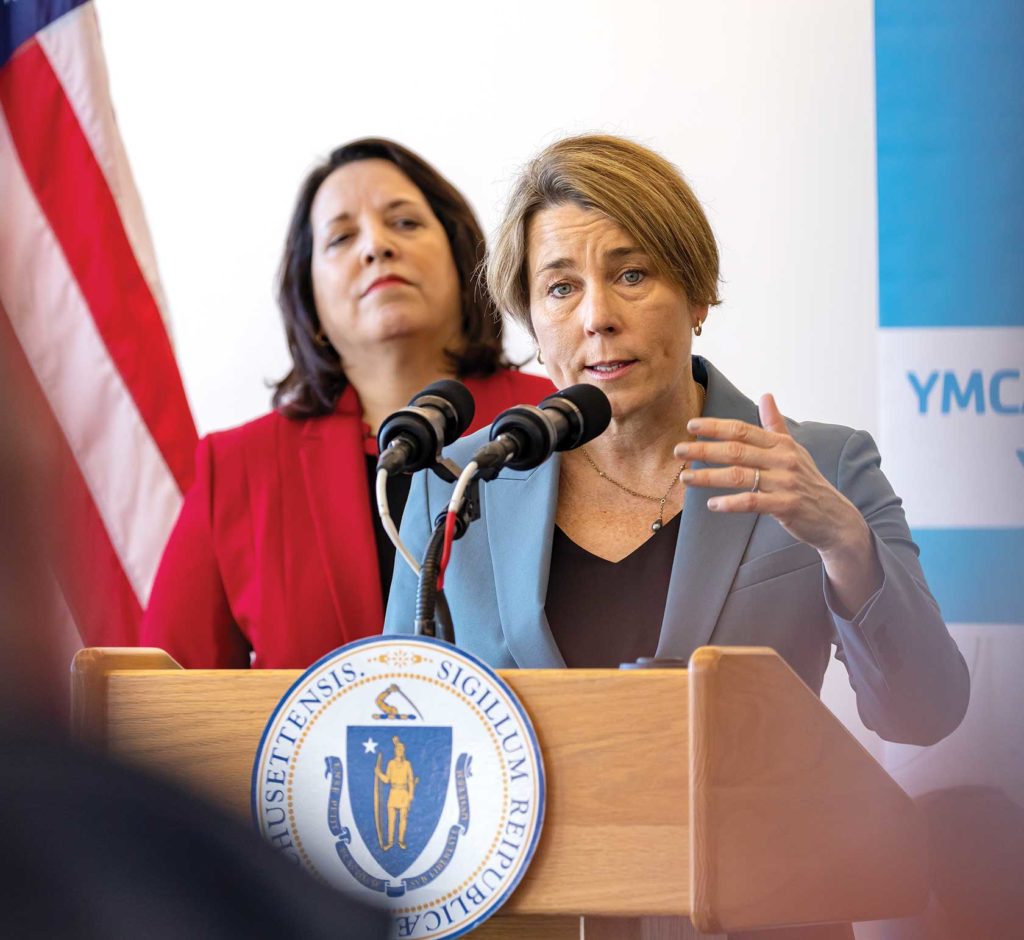Gov. Healey unveils $742 million tax relief plan
Hikes to child tax credits, rental deduction part of the package

Gov. Maura Healey is proposing a $742 million package of tax cuts in the state budget she will file Wednesday, offering relief for parents, renters and seniors alongside other tax reforms.
Healey’s plan shares common ground with the tax proposal former Gov. Charlie Baker could not get over the finish line his final year in office, and it features some other measures that have been kicking around Beacon Hill for years, like a new live theater tax credit and changes to the way locally produced hard cider is taxed.
Announced Monday morning at the Demakes Family YMCA in Lynn, the tax package is centered around a child and family tax credit that Healey touted on the campaign trail. Healey’s office said 700,000 taxpayers would benefit from the $600 per-dependent credit, helping them keep up with climbing costs for child and senior care.
The child and family tax credit, for children under 13, people with disabilities and senior dependents age 65 and up, combines two interrelated existing benefits — the Household Dependent Tax Credit and Dependent Care Tax Credit — while removing the cap on dependents, and increasing the benefits. At a cost to the state of $458 million for the next budget year, it’s the single largest piece of Healey’s proposal.
Healey said she and Lt. Gov. Kim Driscoll are filing this package for people “who are struggling to get by as the cost of living continues to skyrocket past them — the family watching their grocery bill grow each week, the young mom who wants to return to her dream job but can’t afford child care, the recent college graduate who can’t afford both his rent and student loan payments, the seniors who want to keep the home where they raised their family.”
Along with the child and family credit, the plan would increase the rental deduction from $3,000 to $4,000, and double to $2,400 a credit for low-income seniors paying property taxes or rent. In a pair of moves Healey described as ways to make Massachusetts more competitive with other states, the bill would use credits to eliminate the estate tax — which currently kicks in at $1 million — for estates valued up to $3 million and cut the tax rate on short-term capital gains to 5% from 12%.
Last year, Baker filed a nearly $700 million tax plan that also would have boosted credits for dependent and child care, increased the rental deduction, doubled credits for seniors, reformed the estate tax and cut the short-term capital gains tax.
The House and Senate each passed different tax relief bills last year, never agreeing on specifics. Ultimately, legislative leaders shelved the bills after realizing the state would be returning $3 billion in excess revenues to residents, pledging to revisit the issue this year.
Senate President Karen Spilka, at the start of the session in January, called for lawmakers to pass progressive tax relief “soon.” Tax policy bills, though, must start in the House, where Speaker Ron Mariano has talked about watching the state’s fiscal picture before acting.
Healey’s tax package would also:
• expand the list of occupations that qualify for apprenticeship tax credits, and double the statewide cap on those credits to $5 million;
• increase the cap on Housing Development Incentive Program credits, with the goal of producing more market-rate housing in gateway cities;
• increase the cap to $8 million for the state’s dairy tax credit, which Massachusetts Dairy Farmers Association President David Shepard said would “greatly help offset the forecasted difficult times ahead in dairy costs of production and pricing”;
• exempt employer assistance with student loan repayment from taxable income;
• expand tax-deductible commuter transit benefits to include regional transit passes and bike commuter expenses;
• double the credit for lead paint abatement, and double the maximum credit for septic tank repair or replacement in a primary residence, and;
• extend the expiring brownfields tax credit for cleanup of contaminated properties through 2028.
Katie Lannan covers the State House for GBH News.






